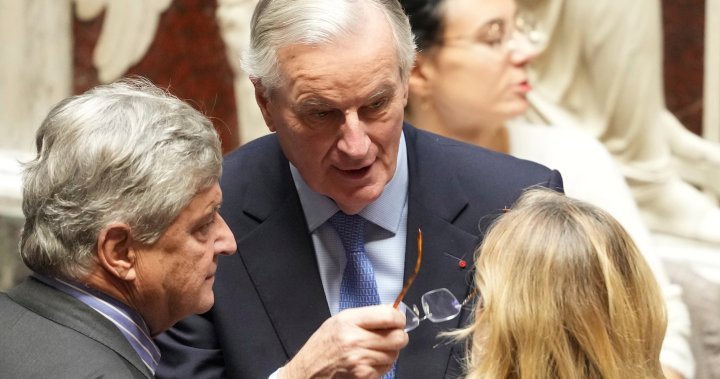Physical Address
304 North Cardinal St.
Dorchester Center, MA 02124
Physical Address
304 North Cardinal St.
Dorchester Center, MA 02124

french language Opposition lawmakers toppled the government on Wednesday, plunging the European Union’s second-largest economy into a deeper political crisis that threatens its ability to pass legislation and rein in its huge budget deficit.
Far-right and left-wing lawmakers joined forces to support a no-confidence motion against Prime Minister Michel Barnier and his government, with a 331-vote majority in favor.
Barnier is expected to submit his and his government’s resignation to the president Emmanuel Macron soon.
No French government had lost a confidence vote since Georges Pompidou in 1962. This time, Macron had ushered in the crisis by calling snap elections in June that created a polarized parliament.
With its president down, France now risks ending the year without a stable government or a 2025 budget, although the constitution allows for special measures to prevent a US government shutdown.
The political upheaval in France will further weaken a European Union already reeling from the collapse of Germany’s coalition government and weeks before US President-elect Donald Trump returns to the White House.
Barnier was chastised by the left and far-right for choosing to use special constitutional powers to ram through parliament without a final vote part of an unpopular budget that sought to save €60bn in a bid to reduce the deficit.

Get the day’s top news, politics, economics and current affairs headlines delivered to your inbox once a day.
Far-right leader Marine Le Pen said a government collapse was “the only way the constitution gives us the chance to protect the French from a dangerous, unjust and punitive budget”.
France is now facing a period of deep political uncertainty, which is already unnerving investors in French government bonds and stocks. Earlier this week, France’s borrowing costs briefly surpassed those of Greece, which is generally seen as much riskier.
Macron now has a choice to make.
Three sources told Reuters that Macron was aiming to appoint a new prime minister quickly, with one of them saying he wanted to name a prime minister before Saturday’s reopening ceremony at Notre Dame Cathedral. Trump has to come.
Any new prime minister will face the same challenges as Barnier in getting bills, including the 2025 budget, passed by a divided parliament. There cannot be new parliamentary elections before July.
Macron could also ask Barnier and his ministers to stay on as a caretaker while he takes time to identify a prime minister who can attract enough cross-party support to pass the law.
The caretaker government could either introduce emergency legislation to push forward the tax-and-spend provisions in the 2024 budget to next year, or use special powers to enact the 2025 draft budget by decree, although lawyers say this is a legal gray area and the political costs would be enormous.
Macron is in danger of his opponents voting out one prime minister after another.
His rivals say the only meaningful way to end the protracted political crisis is to resign, something he has so far shown no desire to do.
The shake-up is not without risk for Le Pen, who has spent years trying to convince voters that her party offers a stable government-in-waiting.
Barnier’s entourage and Le Pen’s National Rally party, which had backed a minority coalition, blame each other for the crisis.

